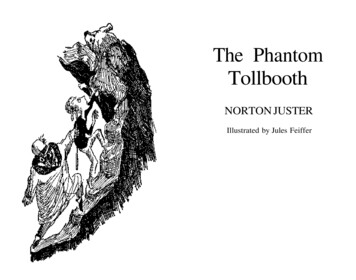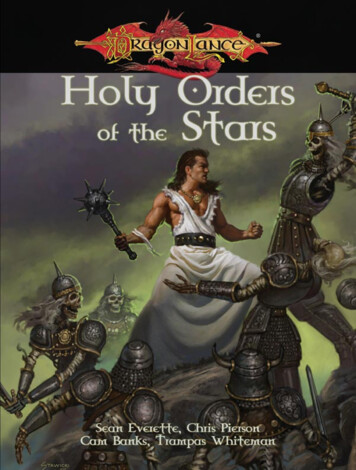
Transcription
Number the StarsLois Lowry
Table of ContentsTitle PageTable of Contents.CopyrightDedicationContentsIntroduction1. Why Are You Running?2. Who Is the Man Who Rides Past?3. Where Is Mrs. Hirsch?4. It Will Be a Long Night5. Who Is the Dark-Haired One?6. Is the Weather Good for Fishing?
7. The House by the Sea8. There Has Been a Death9. Why Are You Lying?10. Let Us Open the Casket11. Will We See You Again Soon, Peter?12. Where Was Mama?13. Run! As Fast As You Can!14. On the Dark Path15. My Dogs Smell Meat!16. I Will Tell You Just a Little17. All This Long TimeAfterwordAbout the AuthorLook for these other books by Lois Lowry:
SandpiperHoughton Mifflin HarcourtBoston New York
Copyright 1989 by Lois LowryAll rights reserved. Published in the United States by Sandpiper,an imprint of Houghton Mifflin Harcourt Publishing Company.Originally published in hardcover in the United States byHoughton Mifflin Books for Children, an imprint of HoughtonMifflin Harcourt Publishing Company, 1989.SANDPIPER and the SANDPIPER logo are trademarks ofHoughton Mifflin Harcourt Publishing Company.For information about permission to reproduce selections from thisbook,write to Permissions, Houghton Mifflin Harcourt PublishingCompany,215 Park Avenue South, New York, New York 10003.www.hmhbooks.comThe Library of Congress has cataloged the hardcover edition asfollows:Lowry, Lois.Number the stars / Lois Lowry.p. cm.Summary: In 1943, during the German occupation of Denmark,ten-year-old Annemarie learns how to be brave and courageous when she helps
shelter her Jewishfriend from the Nazis.1. World War, 1939–1945—Denmark—Juvenile fiction. [1.World War,1939–1945—Denmark—Fiction. 2. World War, 1939–1945—Jews—Rescue—Fiction. 3. Friendship—Fiction. 4. Denmark—Fiction.]I. Title.PZ7.L9673Nu 1989 88-37134[Fic]—dc19 CIPACISBN: 978-0-395-51060-5 hardcoverISBN: 978-0-547-57709-8 paperbackManufactured in the United States of AmericaDOM 10 9 8 7 6 5 4 3 2 1
For my friend Annelise PlattTusind tak
ContentsIntroduction [ ]1. Why Are You Running? [ ]2. Who Is the Man Who Rides Past? [ ]3. Where Is Mrs. Hirsch? [ ]4. It Will Be a Long Night [ ]5. Who is the Dark-Haired One? [ ]6. Is the Weather Good for Fishing? [ ]7. The House by the Sea [ ]8. There Has Been a Death [ ]9. Why Are You Lying? [ ]10. Let Us Open the Casket [ ]11. Will We See You Again Soon, Peter? [ ]12. Where Was Mama? [ ]
13. Run! As Fast As You Can! [ ]14. On the Dark Path [ ]15. My Dogs Smell Meat! [ ]16. I Will Tell You Just a Little [ ]17. All This Long Time [ ]Afterword [ ]
IntroductionIt's hard to believe that I wrote Number the Stars more thantwenty years ago. It seems like yesterday that I answered the phoneon a snowy January morning and received the news that it had beenawarded the 1990 Newbery Medal.Most books published that long ago have faded into a pleasant,undisturbed retirement on dusty library shelves, or become anoccasional topic for a research paper. But Number the Starsseems to have acquired its own long and vibrant life; not a day goesby that I don't hear from a passionate reader of the book—some ofthem parents who remember it from their childhood and are nowreading it with their own children.I think readers of every age match themselves against theprotagonists of books they love. Would I have done that? theyask themselves as they follow a fictional character through a novel.What choice would I have made?And ten—the age of Annemarie in Number the Stars, and theapproximate age of most of the book's readers—is an age whenyoung people are beginning to develop a strong set of personalethics. They want to be honorable people. They want to do the rightthing. And they are beginning to realize that the world they live in isa place where the right thing is often hard, sometimes dangerous,
and frequently unpopular.So they follow a story about a girl their age, caught in afrightening situation, who must make decisions. She could take theeasy way out. She could turn her back on her friend. (As thereaders of Number the Stars grow older and read other Holocaustliterature, they'll find that many people in other countries, notDenmark, did just that). Young readers rejoice when Annemarietakes a deep breath, enters the woods, faces the danger, stands upto the enemy, and triumphs.When the book was newly published, it found its way into thehands and hearts of children who had read about but neverexperienced war. Now, sadly, I have heard from young readerswho have lost a parent or an older brother in Iraq or Afghanistan.We all know how easy it is, and how futile, to blame and to hate.I think the history of Denmark has much to teach us all.The book has been published in many countries now, translatedinto countless different languages from Hungarian to Hebrew.Everywhere children are still reading about the integrity that a smallScandinavian population showed almost seventy years ago. Booksdo change lives, I know; and many readers have told me thatNumber the Stars changed theirs when they were young, that itmade them think about both cruelty and courage. "It was somethingthat shaped my idea of how people should be treated," wrote ayoung woman recently, recalling her own fourth grade experience
with the book.The Danish friend who originally told me the story of herchildhood in Copenhagen in 1943, and who became the prototypefor the fictional Annemarie, is an old woman now. So am I. Weboth love thinking of the children reading the story today, coming toit for the first time and realizing that once, for a brief time and in asmall place, a group of prejudice-free people honored the humanityof others.Lois Lowry
1. Why Are You Running?"I'll race you to the corner, Ellen!" Annemarie adjusted the thickleather pack on her back so that her schoolbooks balanced evenly."Ready?" She looked at her best friend.Ellen made a face. "No," she said, laughing. "You know I can'tbeat you -—my legs aren't as long. Can't we just walk, like civilizedpeople?" She was a stocky ten-year-old, unlike lanky Annemarie."We have to practice for the athletic meet on Friday—I knowI'm going to win the girls' race this week. I was second last week,but I've been practicing every day. Come on, Ellen," Annemariepleaded, eyeing the distance to the next corner of the Copenhagenstreet. "Please?"Ellen hesitated, then nodded and shifted her own rucksack ofbooks against her shoulders. "Oh, all right. Ready," she said."Go!" shouted Annemarie, and the two girls were off, racingalong the residential sidewalk. Annemarie's silvery blond hair flewbehind her, and Ellen's dark pigtails bounced against her shoulders."Wait for me!" wailed little Kirsti, left behind, but the two oldergirls weren't listening.Annemarie outdistanced her friend quickly, even though one of
her shoes came untied as she sped along the street calledØsterbrogade, past the small shops and cafés of her neighborhoodhere in northeast Copenhagen. Laughing, she skirted an elderly ladyin black who carried a shopping bag made of string. A youngwoman pushing a baby in a carriage moved aside to make way. Thecorner was just ahead.Annemarie looked up, panting, just as she reached the corner.Her laughter stopped. Her heart seemed to skip a beat."Halte!" the soldier ordered in a stern voice.The German word was as familiar as it was frightening.Annemarie had heard it often enough before, but it had never beendirected at her until now.Behind her, Ellen also slowed and stopped. Far back, little Kirstiwas plodding along, her face in a pout because the girls hadn'twaited for her.Annemarie stared up. There were two of them. That meant twohelmets, two sets of cold eyes glaring at her, and four tall shinyboots planted firmly on the sidewalk, blocking her path to home.And it meant two rifles, gripped in the hands of the soldiers. Shestared at the rifles first. Then, finally, she looked into the face of thesoldier who had ordered her to halt."Why are you running?" the harsh voice asked. His Danish was
very poor. Three years, Annemarie thought with contempt. Threeyears they've been in our country, and still they can't speak ourlanguage."I was racing with my friend," she answered politely. "We haveraces at school every Friday, and I want to do well, so I—" Hervoice trailed away, the sentence unfinished. Don't talk so much, shetold herself. Just answer them, that's all.She glanced back. Ellen was motionless on the sidewalk, a fewyards behind her. Farther back, Kirsti was still sulking, and walkingslowly toward the corner. Nearby, a woman had come to thedoorway of a shop and was standing silently, watching.One of the soldiers, the taller one, moved toward her.Annemarie recognized him as the one she and Ellen always called,in whispers, "the Giraffe" because of his height and the long neckthat extended from his stiff collar. He and his partner were alwayson this corner.He prodded the corner of her backpack with the stock of hisrifle. Annemarie trembled. "What is in here?" he asked loudly. Fromthe corner of her eye, she saw the shopkeeper move quietly backinto the shadows of the doorway, out of sight."Schoolbooks," she answered truthfully."Are you a good student?" the soldier asked. He seemed to be
sneering."Yes.""What is your name?""Annemarie Johansen.""Your friend—is she a good student, too?" lie was lookingbeyond her, at Ellen, who hadn't moved.Annemarie looked back, too, and saw that Ellen's face, usuallyrosy-cheeked, was pale, and her dark eyes were wide.She nodded at the soldier. "Better than me," she said."What is her name?""Ellen.""And who is this?" he asked, looking to Annemarie's side. Kirstihad appeared there suddenly, scowling at everyone."My little sister." She reached down for Kirsti's hand, hut Kirsti,always stubborn, refused it and put her hands on her hips defiantly.The soldier reached down and stroked her little sister's short,tangled curls. Stand still, Kirsti, Annemarie ordered silently, prayingthat somehow the obstinate five-year-old would receive the
message.But Kirsti reached up and pushed the soldier's hand away."Don't," she said loudly.Both soldiers began to laugh. They spoke to each other in rapidGerman that Annemarie couldn't understand."She is pretty, like my own little girl," the tall one said in a morepleasant voice.Annemarie tried to smile politely."Go home, all of you. Go study your schoolbooks. And don'trun. You look like hoodlums when you run."The two soldiers turned away. Quickly Annemarie reacheddown again and grabbed her sister's hand before Kirsti could resist.Hurrying the little girl along, she rounded the corner. In a momentEllen was beside her. They walked quickly, not speaking, withKirsti between them, toward the large apartment building whereboth families lived.When they were almost home, Ellen whispered suddenly, "I wasso scared.""Me too," Annemarie whispered back.As they turned to enter their building, both girls looked straight
ahead, toward the door. They did it purposely so that they wouldnot catch the eyes or the attention of two more soldiers, who stoodwith their guns on this corner as well. Kirsti scurried ahead of themthrough the door, chattering about the picture she was bringinghome from kindergarten to show Mama. For Kirsti, the soldierswere simply part of the landscape, something that had always beenthere, on every corner, as unimportant as lampposts, throughout herremembered life."Are you going to tell your mother?" Ellen asked Annemarie asthey trudged together up the stairs. "I'm not. My mother would beupset.""No, I won't, either. Mama would probably scold me for runningon the street."She said goodbye to Ellen on the second floor, where Ellenlived, and continued on to the third, practicing in her mind a cheerfulgreeting for her mother: a smile, a description of today's spellingtest, in which she had done well.But she was too late. Kirsti had gotten there first."And he poked Annemarie's book bag with his gun, and then hegrabbed my hair!" Kirsti was chattering as she took off her sweaterin the center of the apartment living room. "But I wasn't scared.Annemarie was, and Ellen, too. But not me!"
Mrs. Johansen rose quickly from the chair by the window whereshe'd been sitting. Mrs. Rosen, Ellen's mother, was there, too, in theopposite chair. They'd been having coffee together, as they didmany afternoons. Of course it wasn't really coffee, though themothers still called it that: "having coffee." There had been no realcoffee in Copenhagen since the beginning of the Nazi occupation.Not even any real tea. The mothers sipped at hot water flavoredwith herbs."Annemarie, what happened? What is Kirsti talking about?" hermother asked anxiously."Where's Ellen?" Mrs. Rosen had a frightened look."Ellen's in your apartment. She didn't realize you were here,"Annemarie explained. "Don't worry. It wasn't anything. It was thetwo soldiers who stand on the corner of Østerbrogade—you'veseen them; you know the tall one with the long neck, the one wholooks like a silly giraffe?" She told her mother and Mrs. Rosen ofthe incident, trying to make it sound humorous and unimportant. Buttheir uneasy looks didn't change."I slapped his hand and shouted at him," Kirsti announcedimportantly."No, she didn't, Mama," Annemarie reassured her mother."She's exaggerating, as she always does."
Mrs. Johansen moved to the window and looked down to thestreet below. The Copenhagen neighborhood was quiet; it lookedthe same as always: people coming and going from the shops,children at play, the soldiers on the corner.She spoke in a low voice to Ellen's mother. "They must be edgybecause of the latest Resistance incidents. Did you read in De FrieDanske about the bombings in Hillerød and Nørrebro?"Although she pretended to be absorbed in unpacking herschoolbooks, Annemarie listened, and she knew what her motherwas referring to. De Frie Danske—The Free Danes —was anillegal newspaper; Peter Neilsen brought it to them occasionally,carefully folded and hidden among ordinary books and papers, andMama always burned it after she and Papa had read it. ButAnnemarie heard Mama and Papa talk, sometimes at night, aboutthe news they received that way: news of sabotage against theNazis, bombs hidden and exploded in the factories that producedwar materials, and industrial railroad lines damaged so that thegoods couldn't be transported.And she knew what Resistance meant. Papa had explained,when she overheard the word and asked. The Resistance fighterswere Danish people—no one knew who, because they were verysecret—who were determined to bring harm to the Nazis howeverthey could. They damaged the German trucks and cars, andbombed their factories. They were very brave. Sometimes theywere caught and killed.
"I must go and speak to Ellen," Mrs. Rosen said, moving towardthe door. "You girls walk a different way to school tomorrow.Promise me, Annemarie. And Ellen will promise, too.""We will, Mrs. Rosen, but what does it matter? There areGerman soldiers on every corner.""They will remember your faces," Mrs. Rosen said, turning in thedoorway to the hall. "It is important to be one of the crowd, always.Be one of many. Be sure that they never have reason to rememberyour face." She disappeared into the hall and closed the doorbehind her."He'll remember my face, Mama," Kirsti announced happily,"because he said I look like his little girl. He said I was pretty.""If he has such a pretty little girl, why doesn't he go back to herlike a good father?" Mrs. Johansen murmured, stroking Kirsti'scheek. "Why doesn't he go back to his own country?""Mama, is there anything to eat?" Annemarie asked, hoping totake her mother's mind away from the soldiers."Take some bread. And give a piece to your sister.""With butter?" Kirsti asked hopefully."No butter," her mother replied. "You know that."
Kirsti sighed as Annemarie went to the breadbox in the kitchen."I wish I could have a cupcake," she said. "A big yellow cupcake,with pink frosting."Her mother laughed. "For a little girl, you have a long memory,"she told Kirsti. "There hasn't been any butter, or sugar forcupcakes, for a long time. A year, at least.""When will there be cupcakes again?""When the war ends," Mrs. Johansen said. She glanced throughthe window, down to the street corner where the soldiers stood,their faces impassive beneath the metal helmets. "When the soldiersleave."
2. Who Is the Man Who RidesPast?"Tell me a story, Annemarie," begged Kirsti as she snuggledbeside her sister in the big bed they shared. "Tell me a fairy tale."Annemarie smiled and wrapped her arms around her little sisterin the dark. Ail Danish children grew up familiar with fairy tales.Hans Christian Andersen, the most famous of the tale tellers, hadbeen Danish himself."Do you want the one about the little mermaid?" That one hadalways been Annemarie's own favorite.But Kirsti said no. "Tell one that starts with a king and a queen.And they have a beautiful daughter.""All right. Once upon a time there was a king," Annemariebegan."And a queen," whispered Kirsti. "Don't forget the queen.""And a queen. They lived together in a wonderful palace, and—""Was the palace named Amalienborg?" Kirsti asked sleepily."Shhh. Don't keep interrupting or I'll never finish the story. No, it
wasn't Amalienborg. It was a pretend palace."Annemarie talked on, making up a story of a king and queen andtheir beautiful daughter, Princess Kirsten; she sprinkled her tale withformal balls, fabulous gold-trimmed gowns, and feasts of pinkfrosted cupcakes, until Kirsti's deep, even breathing told her thather sister was sound asleep.She stopped, waited for a moment, half expecting Kirsti tomurmur "Then what happened?" But Kirsti was still. Annemarie'sthoughts turned to the real king, Christian X, and the real palace,Amalienborg, where he lived, in the center of Copenhagen.How the people of Denmark loved King Christian! He was notlike fairy tale kings, who seemed to stand on balconies giving ordersto subjects, or who sat on golden thrones demanding to beentertained and looking for suitable husbands for their daughters.King Christian was a real human being, a man with a serious, kindface. She had seen him often, when she was younger. Eachmorning, he had come from the palace on his horse, Jubilee, andridden alone through the streets of Copenhagen, greeting his people.Sometimes, when Annemarie was a little girl, her older sister, Lise,had taken her to stand on the sidewalk so that she could wave toKing Christian. Sometimes he had waved back to the two of them,and smiled. "Now you are special forever," Lise had told her once,"because you have been greeted by a king."Annemarie turned her head on the pillow and stared through the
partly opened curtains of the window into the dim September night.Thinking of Lise, her solemn, lovely sister, always made her sad.So she turned her thoughts again to the king, who was still alive,as Lise was not. She remembered a story that Papa had told her,shortly after the war began, shortly after Denmark had surrenderedand the soldiers had moved in overnight to take their places on thecorners.One evening, Papa had told her that earlier he was on an errandnear his office, standing on the corner waiting to cross the street,when King Christian came by on his morning ride. One of theGerman soldiers had turned, suddenly, and asked a question of ateenage boy nearby."Who is that man who rides past here every morning on hishorse?" the German soldier had asked.Papa said he had smiled to himself, amused that the Germansoldier did not know. He listened while the boy answered."He is our king," the boy told the soldier. "He is the King ofDenmark.""Where is his bodyguard?" the soldier had asked."And do you know what the boy said?" Papa had askedAnnemarie. She was sitting on his lap. She was little, then, onlyseven years old. She shook her head, waiting to hear the answer.
"The boy looked right at the soldier, and he said, 'All ofDenmark is his bodyguard.'"Annemarie had shivered. It sounded like a very brave answer."Is it true, Papa?" she asked. "What the boy said?"Papa thought for a moment. He always considered questionsvery carefully before he answered them. "Yes," he said at last. "It istrue. Any Danish citizen would die for King Christian, to protecthim.""You too, Papa?""Yes.""And Mama?""Mama too."Annemarie shivered again. "Then I would too, Papa. If I had to."They sat silently for a moment. From across the room, Mamawatched them, Annemarie and Papa, and she smiled. Mama hadbeen crocheting that evening three years ago: the lacy edging of apillowcase, part of Use's trousseau. Her fingers moved rapidly,turning the thin white thread into an intricate narrow border. Lisewas a grownup girl of eighteen, then, about to be married to PeterNeilsen. When Lise and Peter married, Mama said, Annemarie and
Kirsti would have a brother for the very first time."Papa," Annemarie had said, finally, into the silence, "sometimesI wonder why the king wasn't able to protect us. Why didn't he fightthe Nazis so that they wouldn't come into Denmark with theirguns?"Papa sighed. "We are such a tiny country," he said. "And theyare such an enormous enemy. Our king was wise. He knew howfew soldiers Denmark had. He knew that many, many Danishpeople would die if we fought.""In Norway they fought," Annemarie pointed out.Papa nodded. "They fought very fiercely in Norway. They hadthose huge mountains for the Nor wegian soldiers to hide in. Evenso, Norway was crushed."In her mind, Annemarie had pictured Norway as sheremembered it from the map at school, up above Denmark.Norway was pink on the school map. She imagined the pink strip ofNorway crushed by a fist."Are there German soldiers in Norway now, the same as here?""Yes," Papa said."In Holland, too," Mama added from across the room, "andBelgium and France."
"But not in Sweden!" Annemarie announced, proud that sheknew so much about the world. Sweden was blue on the map, andshe had seen Sweden, even though she had never been there.Standing behind Uncle Henrik's house, north of Copenhagen, shehad looked across the water—the part of the North Sea that wascalled the Kattegat—to the land on the other side. "That is Swedenyou are seeing," Uncle Henrik had told her. "You are looking acrossto another country.""That's true," Papa had said. "Sweden is still free."And now, three years later, it was still true. But much else hadchanged. King Christian was getting old, and he had been badlyinjured last year in a fall from his horse, faithful old Jubilee, who hadcarried him around Copenhagen so many mornings. For days theythought he would die, and all of Denmark had mourned.But he hadn't. King Christian X was still alive.It was Lise who was not. It was her tall, beautiful sister who haddied in an accident two weeks before her wedding. In the bluecarved trunk in the corner of this bedroom—Annemarie could seeits shape even in the dark—were folded Lise's pillowcases withtheir crocheted edges, her wedding dress with its handembroidered neckline, unworn, and the yellow dress that she had
worn and danced in, with its full skirt flying, at the party celebratingher engagement to Peter.Mama and Papa never spoke of Lise. They never opened thetrunk. But Annemarie did, from time to time, when she was alone inthe apartment; alone, she touched Lise's things gently, rememberingher quiet, soft-spoken sister who had looked forward so tomarriage and children of her own.Redheaded Peter, her sister's fiance, had not married anyone inthe years since Lise's death. He had changed a great deal. Once hehad been like a fun-loving older brother to Annemarie and Kirsti,teasing and tickling, always a source of foolishness and pranks.Now he still stopped by the apartment often, and his greetings tothe girls were warm and smiling, but he was usually in a hurry,talking quickly to Mama and Papa about things Annemarie didn'tunderstand. He no longer sang the nonsense songs that had oncemade Annemarie and Kirsti shriek with laughter. And he neverlingered anymore.Papa had changed, too. He seemed much older and very tired,defeated.The whole world had changed. Only the fairy tales remained thesame."And they lived happily ever after," Annemarie recited,whispering into the dark, completing the tale for her sister, who
slept beside her, one thumb in her mouth.
3. Where Is Mrs. Hirsch?The days of September passed, one after the other, much thesame. Annemarie and Ellen walked to school together, and homeagain, always now taking the longer way, avoiding the tall soldierand his partner. Kirsti dawdled just behind them or scamperedahead, never out of their sight.The two mothers still had their "coffee" together in theafternoons. They began to knit mittens as the days grew slightlyshorter and the first leaves began to fall from the trees, becauseanother winter was coming. Everyone remembered the last one.There was no fuel now for the homes and apartments inCopenhagen, and the winter nights were terribly cold.Like the other families in their building, the Johansens hadopened the old chimney and installed a little stove to use for heatwhen they could find coal to burn. Mama used it too, sometimes,for cooking, because electricity was rationed now. At night theyused candles for light. Sometimes Ellen's father, a teacher,complained in frustration because he couldn't see in the dim light tocorrect his students' papers."Soon we will have to add another blanket to your bed," Mamasaid one morning as she and Annemarie tidied the bedroom."Kirsti and I are lucky to have each other for warmth in the
winter," Annemarie said. "Poor Ellen, to have no sisters.""She will have to snuggle in with her mama and papa when itgets cold," Mama said, smiling."I remember when Kirsti slept between you and Papa. She wassupposed to stay in her crib, but in the middle of the night she wouldclimb out and get in with you," Annemarie said, smoothing thepillows on the bed. Then she hesitated and glanced at her mother,fearful that she had said the wrong thing, the thing that would bringthe pained look to her mother's face. The days when little Kirstislept in Mama and Papa's room were the days when Lise andAnnemarie shared this bed.But Mama was laughing quietly. "I remember, too," she said."Sometimes she wet the bed in the middle of the night!""I did not!" Kirsti said haughtily from the bedroom doorway. "Inever, ever did that!"Mama, still laughing, knelt and kissed Kirsti on the cheek. "Timeto leave for school, girls," she said. She began to button Kirsti'sjacket. "Oh, dear," she said, suddenly. "Look. This button hasbroken right in half. Annemarie, take Kirsti with you, after school,to the little shop where Mrs. Hirsch sells thread and buttons. See ifyou can buy just one, to match the others on her jacket. I'll give yousome kroner—it shouldn't cost very much."
But after school, when the girls stopped at the shop, which hadbeen there as long as Annemarie could remember, they found itclosed. There was a new padlock on the door, and a sign. But thesign was in German. They couldn't read the words."I wonder if Mrs. Hirsch is sick," Annemarie said as they walkedaway."I saw her Saturday," Ellen said. "She was with her husband andtheir son. They all looked just fine. Or at least the parents lookedjust fine—the son always looks like a horror." She giggled.Annemarie made a face. The Hirsch family lived in theneighborhood, so they had seen the boy, Samuel, often. He was atall teenager with thick glasses, stooped shoulders, and unruly hair.He rode a bicycle to school, leaning forward and squinting,wrinkling his nose to nudge his glasses into place. His bicycle hadwooden wheels, now that rubber tires weren't available, and itcreaked and clattered on the street."I think the Hirsches all went on a vacation to the seashore,"Kirsti announced."And I suppose they took a big basket of pink-frosted cupcakeswith them," Annemarie said sarcastically to her sister."Yes, I suppose they did," Kirsti replied.Annemarie and Ellen exchanged looks that meant: Kirsti is so
dumb. No one in Copenhagen had taken a vacation at the seashoresince the war began. There were no pink-frosted cupcakes; therehadn't been for months.Still, Annemarie thought, looking back at the shop before theyturned the corner, where was Mrs. Hirsch? The Hirsch family hadgone somewhere. Why else would they close the shop?Mama was troubled when she heard the news. "Are you sure?"she asked several times."We can find another button someplace," Annemarie reassuredher. "Or we can take one from the bottom of the jacket and move itup. It won't show very much."But it didn't seem to be the jacket that worried Mama. "Are yousure the sign was in German?" she asked. "Maybe you didn't lookcarefully.""Mama, it had a swastika on it."Her mother turned away with a distracted look. "Annemarie,watch your sister for a few moments. And begin to peel thepotatoes for dinner. I'll be right back.""Where are you going?" Annemarie asked as her mother startedfor the door."I want to talk to Mrs. Rosen."
Puzzled, Annemarie watched her mother leave the apartment.She went to the kitchen and opened the door to the cupboardwhere the potatoes were kept. Every night, now, it seemed, theyhad potatoes for dinner. And very little else.Annemarie was almost asleep when there was a light knock onthe bedroom door. Candlelight appeared as the door opened, andher mother stepped in."Are you asleep, Annemarie?""No. Why? Is something wrong?""Nothing's wrong. But I'd like you to get up and come out to theliving room. Peter's here. Papa and I want to talk to you."Annemarie jumped out of bed, and Kirsti grunted in her sleep.Peter! She hadn't seen him in a long time. There was somethingfrightening about his being here at night. Copenhagen had a curfew,and no citizens were allowed out after eight o'clock. It was verydangerous, she knew, for Peter to visit at this time. But she w
So they follow a story about a girl their age, caught in a frightening situation, who must make decisions. She could take the easy way out. She could turn her back on her friend. (As the readers of Number the Stars grow older and read other Holocaust literature, they'll find that man











